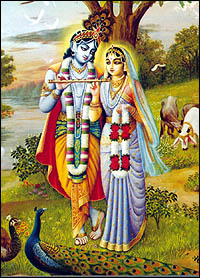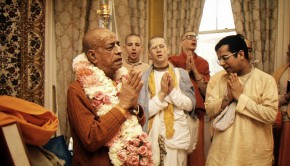We have created a Humbug Civilization
We have created a humbug civilization. Every year so many cars are being manufactured, and for that purpose so many roads have to be excavated and repaired. This creates problems after problems, and therefore it is illusory happiness. We are trying to manufacture some way to be happy, but we only succeed in creating other problems.
Our subject matter is most sublime: the glorification of the holy name of God. This subject was discussed by Maharaja Pariksit and Sukadeva Gosvami, who noted that a brahmana, who was very fallen and addicted to all kinds of sinful activities, was saved simply by chanting the holy names of Krishna. This is found in the Sixth Canto of Srimad-Bhagavatam, an epic work by Vyasadeva describing the pastimes of Lord Krsna and elaborating on the philosophy of Krsna consciousness.
In the Fifth Canto of Srimad-Bhagavatam, the universal planetary systems are very fully explained. Within the universe there are lower, middle and higher planetary systems. Actually, not only the Bhagavatam but all religious scriptures contain descriptions of hellish or lower planetary systems and heavenly or higher systems. Srimad-Bhagavatam gives evidence of where these planets are and indicates how far they are from this planet, just as astronomers have calculated how far the moon and other heavenly bodies are from earth. Similarly, the Bhagavatam contains descriptions of the various planets.
Even on this planet we experience different climatic conditions. In temperate countries such as the United States, the climate is different from that of a tropical country like India. just as there are environmental differences on this planet, there are other planets which have far different atmospheres and environments. After hearing a description of such planets from Sukadeva Gosvami, Pariksit Maharaja said:
adhuneha maha-bhaga yathaiva narakan narah
nanogra-yatanan neyat
tan me vyakhyatum arhasi
“Sir, I have heard from you about the hellish planets. Men who are very sinful are sent to those planets.” (Bhag. 6.1.6)
Pariksit Maharaja was a Vaisnava (devotee), and a Vaisnava always feels compassion for others’ distress. For instance, when Lord Jesus Christ appeared, he was greatly aggrieved by the miserable conditions of the people. Regardless of the country or sect to which they belong, all Vaisnavas or devotees–any people who are God conscious or Krsna conscious–are thus compassionate. Therefore to blaspheme a Vaisnava, a preacher of God’s glories, is a great offense.
Krsna never tolerates offenses committed at the lotus feet of a pure Vaisnava. A Vaisnava, however, is always ready to forgive such offenses. Krpambudhi: A Vaisnava is an ocean of mercy. Vanca-kalpa-taru: Everyone has desires, but a Vaisnava can fulfill all desires. Kalpa-taru refers to a tree in the spiritual world which is called a wish-fulfilling tree. In this material world a particular type of fruit can only be gotten from a particular type of tree, but in Krsnaloka, as well as in all the other planets in the spiritual sky, all the trees are spiritual and will yield whatever one desires. That is described in the Brahma-samhita (cintamani prakara-sadmasu kalpa-vrksa). A pure Vaisnava is compared to such a wish-fulfilling tree, for he can bestow a matchless gift upon a sincere disciple–Krsna consciousness.
 A Vaisnava is addressed as maha-bhaga, which means “fortunate.” One who becomes a Vaisnava and is God conscious is understood to be greatly fortunate. Lord Caitanya Mahaprabhu, the chief exponent of Krsna consciousness in this age, has explained that the living entities in various planetary systems all over the universe are rotating in different species of life. A living entity can go wherever he likes–to heaven or to hell–simply by preparing himself for either place. There are many heavenly planets, many hellish planets, and many species of life. Padma Purana estimates the species of life to be 8,400,000, and the living entity is rotating or wandering through these species and creating bodies according to his mentality in his present life. “As you sow, so shall you reap,” is the law that governs here. Caitanya Mahaprabhu says that out of these numberless living entities who are transmigrating in the material world, one may be fortunate enough to take to Krsna consciousness. Krsna consciousness is being distributed freely everywhere, yet not everyone takes to it, especially in this age of Kali. Because of this, Srimad-Bhagavatam characterizes people in the age of Kali as unfortunate. Therefore Caitanya Mahaprabhu says that only those who are fortunate take to this Krsna consciousness and thus attain a pleasant and blissful life of knowledge.
A Vaisnava is addressed as maha-bhaga, which means “fortunate.” One who becomes a Vaisnava and is God conscious is understood to be greatly fortunate. Lord Caitanya Mahaprabhu, the chief exponent of Krsna consciousness in this age, has explained that the living entities in various planetary systems all over the universe are rotating in different species of life. A living entity can go wherever he likes–to heaven or to hell–simply by preparing himself for either place. There are many heavenly planets, many hellish planets, and many species of life. Padma Purana estimates the species of life to be 8,400,000, and the living entity is rotating or wandering through these species and creating bodies according to his mentality in his present life. “As you sow, so shall you reap,” is the law that governs here. Caitanya Mahaprabhu says that out of these numberless living entities who are transmigrating in the material world, one may be fortunate enough to take to Krsna consciousness. Krsna consciousness is being distributed freely everywhere, yet not everyone takes to it, especially in this age of Kali. Because of this, Srimad-Bhagavatam characterizes people in the age of Kali as unfortunate. Therefore Caitanya Mahaprabhu says that only those who are fortunate take to this Krsna consciousness and thus attain a pleasant and blissful life of knowledge.
It is the duty of a Vaisnava to go from door to door to try to get unfortunate people to accept good fortune. A Vaisnava thinks, “How can these people be delivered from their hellish life?” That was also Maharaja Pariksit’s inquiry. “Sir,” he said, “you have described that because of one’s sinful activities he is put into a hellish condition of life or in a hellish planetary system. Now, what are the methods by which such a person can be saved?” This is a very important question. When a Vaisnava comes, when God Himself comes, or when God’s sons or His very confidential devotees come, their only mission is to save sinful men who are suffering. They have knowledge of how to do this. When Prahlada Maharaja met Lord Nrsimhadeva, he said:
naivodvije para duratyaya-vaitaranyas tvad-virya-gayana-mahamrta-magna-cittah
soce tato vimukha-cetasa indriyartha-
maya-sukhaya bharam udvahato vimudhan
(Bhag. 7.9.43)
“My dear Lord,” Prahlada began, “I am not very anxious for my own deliverance.” At this point we may contrast this attitude with that of the Mayavadi philosophers who are very careful that their personal salvation is never interrupted. They often think, “If down, and my realization will be finished.” Therefore they do not come forward to preach. Only the Vaisnavas come, even at the risk of falldown–but they do not fall down. A Vaisnava is even willing to go to hell to deliver conditioned souls. This is also Prahlada Maharaja’s mission. He went on to say: “I am not very anxious about living in this material world. I have no anxiety for myself because somehow or other I have been trained to be Krsna conscious always.” Because Prahlada was Krsna conscious, he was confident that in his next life he was going to Krsna. It is stated in Bhagavad-gita that if one executes the regulated principles of Krsna consciousness carefully, it is certain that he will reach the supreme destination in his next life. Prahlada Maharaja continues: “There is only one source of anxiety for me. I am anxious for those who are not Krsna conscious. For myself I have no anxiety, but I am thinking of them.” And why aren’t people Krsna conscious? Maya-sukhaya bharam udvahato vimudhan. The rascals have created a humbug civilization for temporary happiness.
Maya-sukhaya. Actually this is a fact. We have succeeded in creating a humbug civilization. Every year so many cars are being manufactured, and for that purpose so many roads have to be excavated, prepared and repaired. This creates problems after problems, and therefore it is maya-sukhaya, illusory happiness. We are trying to manufacture some way to be happy, but we only succeed in creating other problems. The United States has the world’s largest number of cars, but that does not solve any problems. We have manufactured cars to help solve the problems of life, but we often experience that this also creates other problems. Once we create cars, we must travel thirty or forty miles just to meet our friends or go to a doctor. We can even go from New York to Boston in less than an hour by plane, but it takes even longer than that just to get to the airport. This situation is called maya-sukhaya. Maya means false, illusory. We try to create a very comfortable situation, but we only succeed in creating another uncomfortable situation. This is the way of the material world; if we are not satisfied by the natural comforts offered by God and nature, and we want to create artificial comforts, then we have to create discomfort also. Most people, ignorant of this fact, think that they are creating a very comfortable situation, but in actuality they end up traveling fifty miles to go to the office to earn a livelihood and fifty miles to come back.
Due to such conditions, Prahlada Maharaja says that these vimudhas, materialistic persons, have unnecessarily burdened themselves simply for temporary happiness. Vimudhan, maya-sukhaya bharam udvahato. Therefore in Vedic civilization it is recommended that one free himself from material life, take sannyasa, the renounced order, and execute devotional service with no anxiety.
The taking of the renounced order, however, is not always necessary. If one can execute Krsna consciousness in family life, that is also recommended. Although Bhaktivinoda Thakura was a family man and magistrate, he still executed devotional service most excellently. Dhruva Maharaja and Prahlada Maharaja were also grhasthas, householders, but they trained themselves in such a way that even as householders they were not faced with interruptions in their service. Therefore Prahlada Maharaja said, “I have learned the art of always remaining in Krsna consciousness.” What is that art? Tvad-virya-gayana-mahamrta-magna-cittah: simply glorifying the victorious activities and pastimes of the Lord. The word virya means “very heroic.” By reading Srimad-Bhagavatam, we can come to understand that Krsna’s activities, His fame, His associates and everything else about Him are all heroic. In this connection, Prahlada Maharaja said: “I am certain that wherever I go, I can glorify Your heroic activities and be saved. There is no question of my falling down, but I am simply anxious for those who have created a type of civilization in which they are always busy working hard. I am thinking of them.” Prahlada further says:
prayena deva munayah sva-vimukti-kama maunam caranti vijane na parartha-nisthah
naitan vihaya krpanan vimumuksa eko
nanyam tvad asya saranam bhramato ‘nupasye
“My dear Lord, there are many saintly persons and sages who are very interested in their own liberation. They live in solitary places like the Himalayan mountains, they do not talk to anyone, and they are always afraid of mixing with ordinary people in the cities and becoming disturbed or maybe even falling down. They think, “Better let me save myself.” I regret that these great saintly persons do not come to the cities where people have manufactured a civilization based on constant hard work. Such saints are not very compassionate, but I am anxious for these fallen people who are unnecessarily working so hard simply for the gratification of the senses.” (Bhag. 7.9.44)
Even if there were some point in working that hard, such people do not know what it is. All they know is the sex urge and the brothels that gratify this urge. However, Prahlada Maharaja has compassion for such people: naitan vihaya krpanan vimumuksa eko. “My Lord, I do not need salvation alone. Unless I take all these fools with me, I shall not go.” Thus he refused to go into the kingdom of God without taking all the fallen souls with him. This is a Vaisnava. Nanyam tvad asya saranam bhramato ‘nupasye: “I simply want to teach them how to surrender unto You. That’s all. That is my goal.”
Surrender is thus emphasized because a Vaisnava knows that as soon as he surrenders, the path is clear.
naivodvije para duratyaya-vaitaranyas tvad-virya-gaya na-mahamrta-magna-cittah
“Somehow or other, let them all bow down before Krsna.” This is a very simple method. All one has to do is bow down before Krsna with faith and say, “My Lord Krsna, I was forgetful of You for so long, for so many lives. Now I have come to consciousness of You. please accept me.” That is all. If one simply learns this technique and sincerely surrenders himself to the Lord, his path is immediately opened. This is the aim of a real Vaisnava.
A Vaisnava is always thinking about how the fallen conditioned souls can be delivered and is always involved in making plans to do so. The Gosvamis, the chief disciples of Lord Caitanya Mahaprabhu, were such Vaisnavas, and were thus described by Srinivasa Acarya:
nana-sastra-vicaranaika-nipunau sad-dharma-samsthapakau lokanam hita-karinau tribhuvane manyau saranyakarau
radha-krsna-padaravinda-bhajananandena mattalikau
vande rupa-sanatanau raghu-yugau sri-jiva-gopalakau
“The six Gosvamis–Sri Sanatana Gosvami, Sri Rupa Gosvami, Sri Raghunatha Bhatta Gosvami, Sri Raghunatha Dasa Gosvami, Sri Jiva Gosvami and Sri Gopala Bhatta Gosvami–are very expert in scrutinizingly studying all the revealed scriptures with the purpose of establishing eternal religious principles for the benefit of all human beings. They are always absorbed in the mood of the gopis and are engaged in the transcendental loving service of Radha and Krsna.”
With similar Vaisnava compassion, Pariksit Maharaja told Sukadeva Gosvami: “You have just described the different types of hellish life. Now, tell me how those who are suffering can be delivered. Kindly explain this to me.” Adhuneha maha-bhaga yathaiva narakan narah nanogra-yatanan neyat tan me. The word narah refers to human beings, or those who are fallen. Narakan narah nanogra-yatanan neyat tan me: “How can they be delivered from their fierce miseries and horrible pains?” That is typical of a Vaisnava heart. Maharaja Pariksit also said, “Somehow or other they have fallen down to a hellish life, but that does not mean that they should remain in that condition. There must be some means by which they can be delivered, so kindly explain those means.”
Sukadeva Gosvami replied:
na ced ihaivapacitim yathamhasah krtasya kuryan mana-ukta-panibhih
dhruvam sa vai pretya narakan upaiti
ye kirtita me bhavatas tigma-yatanah
“Yes, I have already described various hellish conditions typical of a severe and painful life. The point is that one has to counteract such a life.” (Bhag. 6.1.7)
How can this be done? There are various ways in which sinful activities can be committed. One is by the mind. If a person thinks of committing some sinful activity and thus makes a plan–“I shall kill that man”–that is also considered to be sinful. When the mind is thinking, feeling and willing, then there is action. In certain areas of the United States, a dog owner is responsible according to law if his dog barks at someone passing on the road. Although the dog simply barks, the owner is held responsible. The dog is not responsible because it is an animal, but because the owner of the animal has made the dog his best friend, he is responsible by law. Similarly, just as the barking of a dog may be considered unlawful, offensive speech may also be considered sinful, for it is just like barking. The point is that sinful activities can be committed in so many ways–one may think of them, or one may speak sinfully, or one may actually commit a sin. In any case, they are all considered sinful activities. Dhruvam sa vai pretya narakan upaiti: One has to suffer punishment for such activities.
People do not believe in a next life because they want to avoid botheration and punishment, but the next life cannot be avoided. It is a well known fact that we must act according to law, or we will be punished. If one commits criminal activities, the state will punish him. Sometimes, however, a criminal may escape punishment by the state, but this is not the case with God’s law. One can cheat others, commit theft and hide, thereby saving himself from the punishment of the state, but one cannot save himself from the superior law, the law of nature. It is very difficult because there are many witnesses: the daylight is witness, the moonlight is witness, and Krsna is the supreme witness. Thus one cannot say, “I am committing this sin, but no one can see me.” Krsna is the supreme witness sitting within the heart, and He not only notes what one is thinking and doing, but He also gives the living entity facility. If one wants to do something in order to satisfy his senses, Krsna gives all facility. This is stated in Bhagavad-gita. Sarvasya caham hrdi sannivistah: “I am sitting in everyone’s heart.” Mattah smrtir jnanam apohanam ca: “From Me come remembrance, knowledge and forgetfulness.”
In this way Krsna gives us a chance. If we want Krsna, He will give us a chance to have Him, and if we don’t want Krsna, He will give us a chance to forget Him. If we want to enjoy life forgetting Krsna, forgetting God, Krsna will give us all facility so that we can forget, but if we want to enjoy life in Krsna consciousness, Krsna will give us the chance to make progress. That is up to us. If we think that we can be happy without Krsna consciousness, Krsna does not object to that. Yathecchasi tatha kuru. After advising Arjuna, He simply said, “Now I have explained everything to you. Whatever you desire, you can do.” Arjuna replied immediately, karisye vacanam tava: “Now I shall execute Your order.” That is Krsna consciousness.
God does not interfere with our tiny independence. If we want to act according to the order of God, then He will help us. Even if one falls down sometimes, if one becomes sincere, thinking, “From this time I shall remain Krsna conscious and execute His orders,” then Krsna will help him. In all respects, even if one falls down, he will be excused and given more intelligence. This intelligence will say, “Don’t do this. Now go on with your duty.” But if one wants to forget Krsna, if he wants to become happy without Krsna, the Lord will give so many chances to enable him to forget Him life after life.
Pariksit Maharaja said: “It is not that if I say there is no God that there will be no God or that I will not be responsible for what I do.” The atheists deny God due to their sinful activities. If they thought that there were a God, they would shudder at the thought of punishment; therefore they deny His existence. When rabbits are attacked by larger animals, they close their eyes and think, “I am not going to be killed,” but they are killed anyway. Similarly, we may deny the existence of God and His laws, but still God and His laws are there. In the high court, one may say, “I don’t care for the law of the government,” but he will be forced to accept the government law. If one denies the state law, he will be put into prison and duly punished. Similarly, one may foolishly decry the existence of God by various means (“There is no God,” or “I am God”), but ultimately one is responsible for all his actions, both good and bad.
According to the law of karma, or the law governing activities, if we act properly and perform pious activities, we are awarded by good fortune, and if we act sinfully we have to suffer. Therefore Sukadeva Gosvami says:
tasmat puraivasv iha papa-niskrtau yate ta mrtyor avipadyatatmana
dosasya drstva guru-laghavam yatha
bhisak cikitseta rujam nidana-vit
“You should know that you are responsible, and, according to the gravity of your sins, you should accept some type of atonement as described in the sastras or scriptures.”(Bhag. 6.1.8)
Just as doctors are sought when one is diseased, according to the Vedic way of life there is a class of brahmanas to whom one should go for prescribed atonement for sinful activities. There are different types of atonement. If a person commits a sin and counteracts it by penance, that is atonement. There are examples of this in the Christian Bible. Sukadeva says that one has to execute the prescribed atonement according to the gravity of his sinful activities. A physician may prescribe an expensive medicine or a cheap medicine according to the gravity of the disease. For a headache, he may simply prescribe an aspirin, but if there is some severe illness he may prescribe a surgical operation which will cost thousands of dollars. Similarly, sinful activities are diseases, so one should follow the prescribed cures to become healthy.
By accepting the chain of birth and death, the soul accepts a diseased condition. The soul is not subject to birth, death or disease because it is pure spirit. In Bhagavad-gita Krsna says that a soul has no birth (na jayate) and that it has no death (mriyate).
na jayate mriyate va kadacin nayam bhutva bhavita va na bhuyah
ajo nityah sasvato ‘yam purano
na hanyate hanyamane sarire
“For the soul there is never birth or death. Nor, having once been, does he ever cease to be. He is unborn, eternal, ever-existing, undying and primeval. He is not slain when the body is slain.” (Bg. 2.20)
Modern civilization is in dire need of an educational system to give people instructions on what happens after death. In actuality the present educational system is most defective because unless one knows what happens after death, one dies like an animal. An animal does not know that he is subject to death or that he is going to have to take another body. Human life, however, should be more elevated. One should not simply be interested in the animalistic functions of eating, sleeping, defending and mating. A living entity may have an abundant supply of food for eating, or many nice buildings for sleeping, or good arrangements for sex life, or a good defense to protect him, but this does not mean that he is a human being. A civilization which is based on these activities should be known to be animalistic. Since animals are also interested in these functions, what is the difference between human life and animal life if a human being does not go beyond them?
The distinction can be made when a human being becomes inquisitive and asks, “Why have I been put into this miserable condition? Is there any remedy for it? Is there perpetual eternal life? I do not want to die, nor do I want to suffer. I want to live very happily and peacefully. Is there a chance for this? What is the method or science by which this can be achieved?” When these questions are asked, and steps are taken to answer them, our human civilization is the result. If the questions never arise, then that civilization should be known as animalistic. Animals and animalistic human beings are simply interested in continuing the process of eating, sleeping, mating and defending, but in actuality this process is forced to break down. The fact is that there is no real defense because no one can protect himself from the hands of cruel death. For instance, Hiranyakasipu, who wanted to live forever, underwent severe austerities, but he was foiled in the end by the Lord Himself in the form of a lion-man, Nrsimhadeva, who killed Hiranyakasipu with His claws. So-called scientists are now claiming that some time in the future we shall stop death by scientific methods, but this is simply another crazy utterance. Stopping death is not at all possible. We may make great advancements in scientific knowledge, but there is no scientific solution to the fourfold miseries of birth, death, old age and disease.
One who is intelligent should be eager to solve these four principal problems–birth, death, old age and disease. No one wants to die, but there is no remedy. Everyone has to die. Everyone is very anxious to stop the skyrocketing increase of population by employing contraceptive methods, but still birth is going on. There is no stoppage of death, and there is no stoppage of birth. Nor can diseases be stopped, nor can old age, despite all of the latest inventions in medicine.
One might think that he has solved all the problems of his life, but where is the solution to these four problems of birth, death, old age and disease? That solution is Krsna consciousness. Every one of us is giving up his body at every moment, and the last phase of giving up this body is called death. But Krsna also says:
janma karma ca me divyam evam yo vetti tattvatah
tyaktva deham punar janma
naiti mam eti so ‘rjuna
“One who knows the transcendental nature of My appearance and activities does not, upon leaving the body, take his birth again in this material world, but attains My eternal abode, O Arjuna.” (Bg. 4.9)
What happens to such a person? Mam eti–He returns to Krsna. If we are to go to Krsna, we must prepare a spiritual body. That preparation is the process of Krsna consciousness. If one keeps himself in Krsna consciousness, he gradually prepares his next body, a spiritual body, which will carry him immediately to Krsnaloka, Krsna’s abode, and he will become happy living there perpetually and blissfully.
Matchless Gift Chapter 2 by
His Divine Grace A.C. Bhaktivedanta Swami Prabhupada















Hare krishna Iam 17 years old .my parents wanted me to do MBBS. But I wanted to study Vedas and be an absolute devote of Krishna .can you suggest any institution for admission
There is no suitable institution at the moment. ISKCON is full of pedophiles and they will teach you something quite different from Krishna consciousness. Nowadays the best thing is to manage somehow in the material world. Get some education, but at the same time read Srila Prabhupada’s books. You can be a pure devotee and live a life in the material world as well. That is really the only option open to most at the moment.
Hare Krishna Madhudvisa Dasa,
First of all thank you very much for sending across all these emails, I truely appreciate it and am glad I signed up for your newsletters. I thought of posting a comment so I know for sure this comment would be read by you. I know it says in the Bhagavad Gita that I am required to approach a guru who can guide me in the right path but due to my current circumstances, I am unable to do that. I just have a question and if you could answer it then I would just consider that my good luck. In the Bhagavad Gita it is said that one should follow out his duties, without thinking about the result. What my question is that I’m not quite sure of what my duty is. I am 17 years old and in my last year of finishing school and my whole family has high hopes from me to study medicine and become a doctor. Initially, it was I who wanted to study medicine and had my heart and soul into studying for that. But now that is not what I want to do. I actually really enjoy being a devotee of the Lord. Recently, something in me just says that why do I need to study so much, for nearly 10 years and more to become a doctor, when I actually enjoy and receive pleasure in being a devotee of the Lord. I have also read some of Srila Prabhupada’s lectures and he specifically mentions that people study all these things but nothing is greater than the pure transcendental knowledge Sri Krishna left behind for us. I completely agree with Srila Prabupada with this statement. I’m not sure if its too early for me to say this but I am seriously, with my heart and soul, considering renouncing this world. I don’t want anything materialistic from this world. I don’t have any concerns about how much money I have or anything. All I want to do is settle in Vrindavan (I am currently in Australia) and only devote this whole life time by rendering service to Lord Krishna, along with his numerous other devotees. With an exception of my mother, who herself wants to renounce the world with me, my whole family is against this. They are still in ignorance and when my mother and I even talk about Krishna Consciousness, they just don’t care or don’t want to listen or misinterpret what we are trying to say. My family and friends think I have changed and that I am overreacting and doing too much, but I just ignore them and think of Krishna. Anyways, just summing up, my question is that now that my family has such high expectations from me about me becoming a doctor but if I don’t even attend college but instead devote my life to Krishna, am I running away from my duty by not studying medicine, even thought I just want to renounce everything and just remain in Krishna Conciousness?
Your answer to my question would be greatly appreciated!
Hare Krishna
Hare Krishna Natasha
It is a very nice to read your letter.
You have the right idea. Life is meant for serving Krishna. Actually everything else is a waste of time. Our duty actually is to serve Krishna and and the bona fide spiritual master is the one who can guide us and direct us actually how to do that.
The real work for a devotee in the service of Krishna is not sitting down in Vrindavan, it is preaching to the people of the world. Prahalada Maharaja had this mood. He did not want to go to a solitary place to meditate for his own spiritual advancement. He saw that the people of the world were suffering due to a lack of Krishna consciousness. And because he was feeling compassion for the suffering humanity he wanted to help them by giving them Krishna consciousness.
This is Srila Prabhupada’s mood. He did not sit in Vrindavan for his own spiritual benefit. He went everywhere to spread the glories of Lord Krishna all over the world.
Of course we can not really preach if we do not have the knowledge about the science of Krishna and am not following it ourselves.
So it is very important to read Srila Prabhupada’s books. If instead of reading and studying medical books for ten years if you spend ten years reading and studying Srila Prabhupada’s books and if you put what you read in those books into practice in your life you will see a wonderful improvement in your spiritual life and at the same time you will get the best education.
Veda means knowledge and Srila Prabhupada’s books give us the essence of the entire Vedas. So simply by reading Srila Prabhupada’s books you will get the best education and even from the material point of view people will consider you a very learned personality and you will be able to speak to and give good instruction to the greatest scientists, the greatest philosophers, the greatest politicians…
So you have the right idea of not wasting ten years of valuable life studying medical books.
There are plenty of doctors. Really there is no shortage of doctors at all. But pure devotees, they are very hard to find. There are practically none. So the world is facing an acute shortage of pure devotees at the moment, but we have plenty of doctors. So it is much better that you become a pure devotee of Krishna by reading Srila Prabhupada’s books and putting his instructions into practice in your life….
Nice to hear from you. Chant Hare Krishna and be happy!
Madhudvisa dasa
Please don’t take it as offensive But what about the parents who give him education, and spend so much money for him. Parent have so much hope from him.
The business of the parent is to educated their children so they will not have to take another birth in the material world. So if parents are not providing the children this sort of education, Krishna consciousness, then the children have to reject the parents and become Krishna conscious independently of the parents.
The purpose of this human form of life is to make a solution of the problems of birth, old age, disease and death. We have to break the cycle of samsara, the cycle of reincarnation, of repeated birth and death. We have to make this life our last in the material world by remembering Krishna at the time of death. And Krishna guarantees in Bhagavad-gita that “Whoever remembers Me at the time of death will come to Me without doubt.” So we have to take that education, Krishna conscious education.
Chant Hare Krishna and be happy!
Madhudvisa dasa
Christ said we shouldn’t work for money.
Modern world. A sosial destruction by selfish desires.
When a person wants to help a person, he is called a worker. When a person is instead serving his prime need, food, thereby requires money so he seeks for work, he wants work to be created so he can fulfill his belly. Working uselfishly makes the person detach from work as he solves the issue his lets say patient have.
Why, if humans work for money, dont they understand that they create work for themselves, that they are harming society?
Well, humans may not know it as humans have the tendency especially in the west to be unconcentrated. But the SuperSoul, or God, who sees each of us and our wishes helps us achieve what we want. So there is an external force, that, keep in mind, did not seek to create lets say diseases for a doctor to help him acquire work as it was not his wish but fulfilles our wishes, just as a father to his children, meaning us.
My mother dishonoured me to the extent that i became sick, paranoid and schizophrenic. She is a psychiatrist. My father told me I was evil, to my brotner that he was stupid and maybe even evil. These qualities belong to thieves, feeling stupid will make you seek externally, feeling evil will not help you dare ask to receive but you will instead feel that you need to steal.
Until we stop serving money and use our minds and not our stomachs to help eachother and by that receive freedom of work, the utopia of a modern world in happiness and peace will mearly remain an illusion.
For we all know it, humans are within telepathical, I am but I was born like that, I believe I saw my father sending out gold to the pitical TV show one day and since we in the west didnt dare to go out and experience we lost faith in love and became unified from within instead of having a concrete self within so this new modern world is indeed a place of suffering as great souls beeng also friends ive had that helps me hang on by hoping for me to be cool like them are great based on the opposite of telepathy, beeng thereby self realization..
– hoLkaPoLka